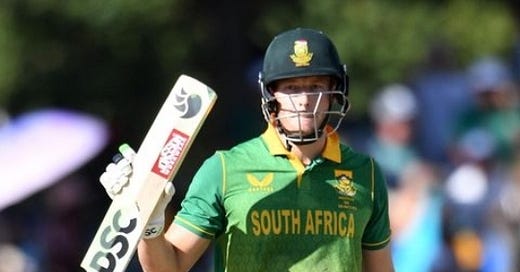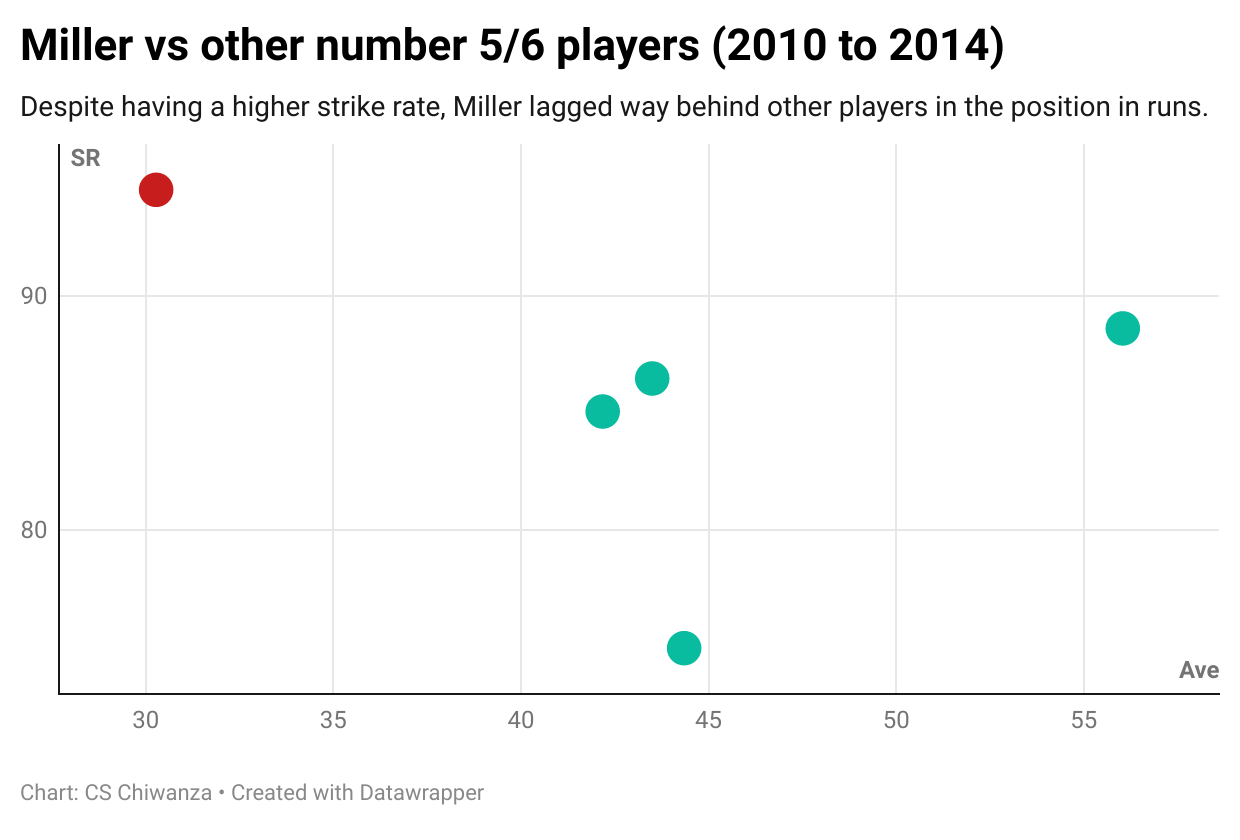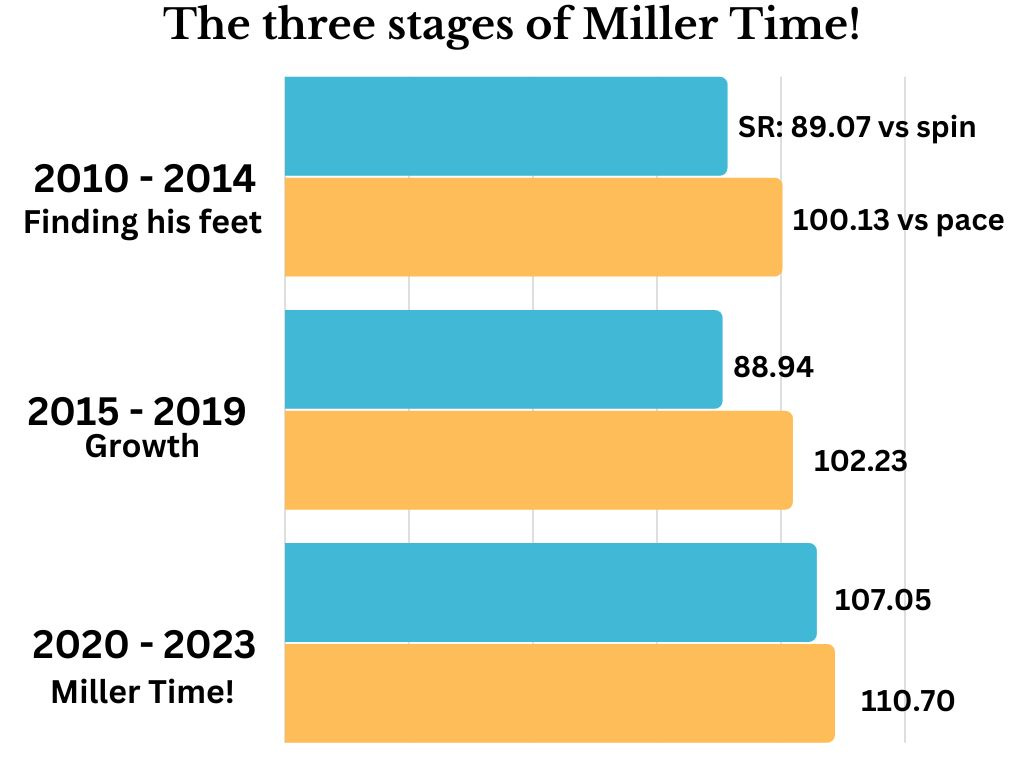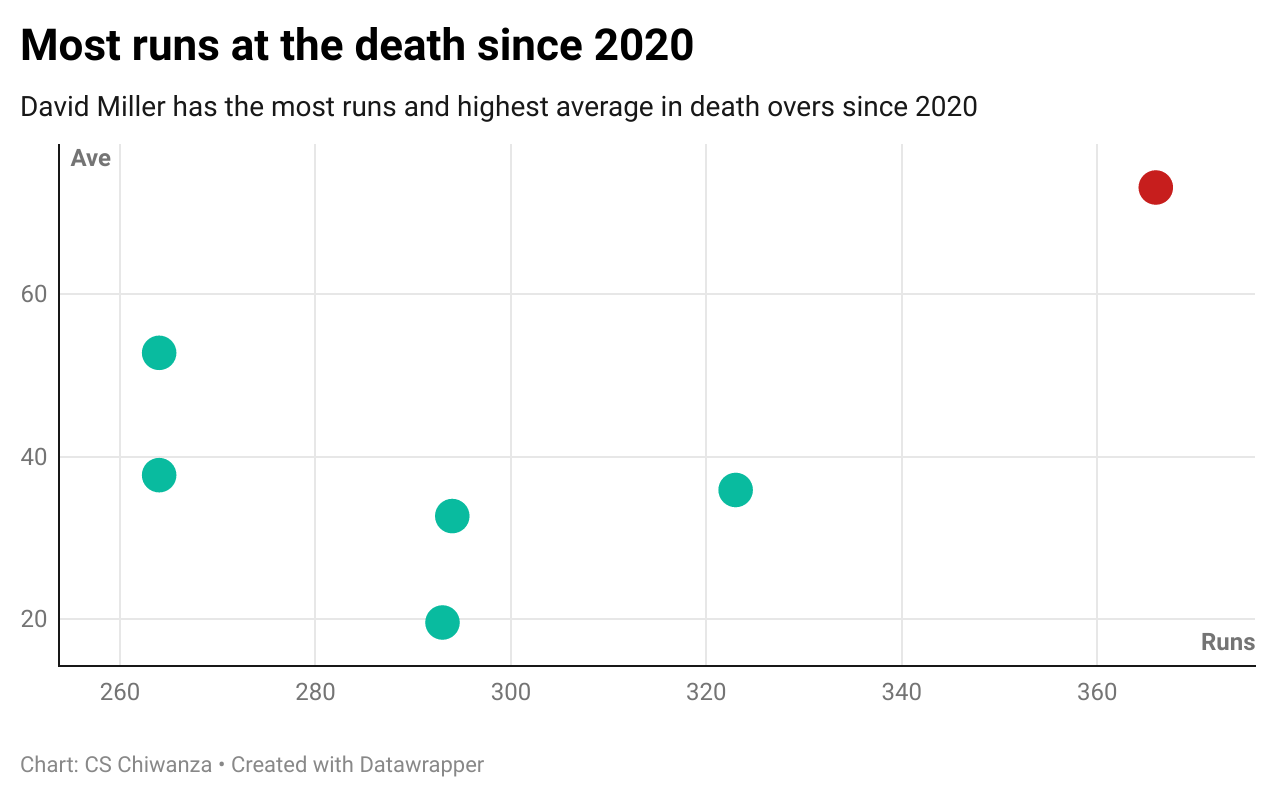David Miller is one of three players with at least 100 ODI caps who average above 40 and have a strike rate of over 100. The other two are AB de Villiers and Jos Buttler. He is in good company.
Hello, welcome to Stumped! If you are not yet a subscriber, join more than a thousand other professional athletes & ex-pros, coaches, commentators & analysts and casual sports fans that receive the newsletter in their inbox each week — it’s free:
Jonty Rhodes’ career at Maritzburg College was sandwiched between two scores of 99.
In his first week at Maritzburg College, 13-year-old Jonty Rhodes' was on 99 when their coach, who was also acting as the umpire, decided that their team had enough runs on the board. So he declared the innings and put in the visiting team to bat. The teacher had no idea that Rhodes was on 99. Rhodes had no idea that he was on 99. There was no scoreboard to tell them that he was on 99. The only person who knew that Rhodes was on 99 was the scorer.
On Monday morning after assembly, the whole school knew. He became the kid who was left stranded on 99.
Mike Procter was one of two people who held the record for the most consecutive hundreds in schoolboy cricket. Despite its proud cricketing history, no Maritzburg College player had ever scored three consecutive centuries. In 1987, the school grew giddy with excitement when Jonty Rhodes brought up his second consecutive ton, an unbeaten 152 against Glenwood. The first century was an impressive 127 runs against Kearsney.
Rhodes opened the batting at Maritzburg College and he carried his bat when he scored his unbeaten century against Glenwood. He also carried his bat when he brought up the third century to make history for Maritzburg College, an unbeaten 137 against Michaelhouse. He was on track to a record-breaking fourth consecutive century when he was left stranded on 99. This time it was because the scorers could not agree on a figure.
There were three score sheets. There was a Maritzburg College scorer, a scoring parent and a Beachwood High scorer. The first two had Rhodes on 101 when he was dismissed. The Beachwood High School scorer had Rhodes on 99. “Our coach chose to go along with the home team’s score,” says Rhodes.
Rhodes closed the year with a record 1384 runs. No other Maritzburg College learner has reached that mark since. Despite this incredible run, when he left the school, Rhodes assumed that his cricket career was over. Rhodes grew up in the 70s and 80s, there was no dream of international cricket for him and his peers. Soccer was his sporting dream. Rhodes entertained the idea of pursuing a football career in the UK.
Rhodes’ international career happened by chance. He also became South Africa’s highest run-scorer in the number five and six slot by chance. “I was never a big hitter, but our team had excellent batters and I was shifted from number five to six. When he moved me to that position, Graham Ford said to me, ‘We have Klusener and Pollock who are big hitters, but we also need someone who can bat to the end.’”
In his Matric year, David Miller had his best season for Maritzburg College. He averaged 65.81 runs in 21 innings. Miller’s average was 0.19 fewer runs than Rhodes’ in his Matric year. He missed Rhodes’ 1384-run record by 331 runs. Part of the reason why he could not equal or surpass that record is that Miller played fewer innings than Rhodes. The second part of it is that Rhodes played declaration cricket - Rhodes learned the art of batting for long periods as a youngster - while Miller played 50-over cricket.
Like Rhodes, Miller opened the batting for Maritzburg College. Also like Rhodes, he became South Africa’s batter in the number five and six slot by chance. He made his ODI debut in a team that had Hashim Amla, Graeme Smith, Jacques Kallis, AB de Villiers and JP Duminy. There was no space for him in positions from one to five.
Miller struggled in his new position. He was not a big hitter and he did not often bat to the end. Between 2010 and 2014, Miller’s numbers tell a not-so-great story. Despite being surrounded by great talent, it took Miller a long time to score 1000 ODI runs. 48 innings.
In the first four years of his career, Miller averaged 30.28 at a strike rate of 94.54. With his average, he was way behind that of other players who batted in that slot in the same period. The top 10 had, among others, MS Dhoni (56.04), Misbah-ul-Haq (44.35), George Bailey (43.50) and Angelo Matthews (42.18). Miller came in at number 23.
He had potential. Miller was a prospect for four years.
After a four-year apprenticeship, Miller didn’t just evolve into a number five/six player, he developed the ability to shapeshift as the game required. He also managed to bump up his average to 39.71 while he was doing so.
During the 2015 World Cup, South Africa needed a finisher. Miller scored 324 runs at an average of 64.80 and a strike rate of 134.05. Only the trio of AB de Villiers, Faf du Plessis and Hashim Amla scored more runs for South Africa. De Villiers, Glenn Maxwell and Brendon McCullum were the only players who scored runs at a higher rate than Miller.
Jonty Rhodes did not score many centuries in his ODI career. One of his favourite knocks was against New Zealand at the WACA. When he arrived at the crease, South Africa was on 35 for four. Rhodes scored an unbeaten 107 to lead South Africa to 270 for five. When South Africa needed David Miller to replicate such heroics, stabilize, consolidate and lead the team to victory, he did so. A favourite of many is Miller’s 2018 knock against Australia. South Africa was on 55 for three when Miller arrived at the crease. He scored a match-winning 139.
“Batting at number five and six, sometimes all you need to do is score a valuable 15 or 20 runs to help the team win. I did a lot of that,” says Rhodes. Miller has done and still does a lot of that. He had moments where he had to score 20 singles to win the match. One of Andrew Miller’s favourite knocks is when David Miller scored 23 runs from 26 balls to lead the Proteas to victory.
This Substack column exists thanks to patrons and readers that leave tips. Stumped! is wholly supported by Readers Like You. To keep the weekly posts coming and to keep the lights on here, consider leaving a tip or supporting monthly on Patreon. You won’t regret it!
If the periods 2010 to 2014 and 2015 to 2019 are distinct stages of David Miller’s career, we are now firmly into a new age, the third stage: Miller Time!
Since 2020, David Miller has been scoring more runs at a faster rate. For most players, attacking a higher proportion of deliveries faced also results in them being more innovative. Joe Root recently unfurled audacious reverse scoops as he embraced England’s attacking brand in Test cricket. That is not true for David Miller. One is unlikely going to catch Miller playing ramp shots or reverses.
He has stuck to the fundamentals of his batsmanship. Though he has tweaked his technique, especially against spin*, his range of shots has almost remained the same. His balance is better than ever and scores with good cricket strokes on both sides of the wicket. The greatest change David Miller has made has been mental, he has adopted a different mindset.
*Will discuss this detail in a piece on Miller’s T20 game.
When David Miller made his debut for the Proteas, he was a talented opener feeling his way through the middle order and trying to survive simultaneously. More than 10 years later, Miller is unencumbered by such problems. He plays like a free man because he is free of such preoccupations. He understands himself and his game more. He is mature.
David Miller made his Proteas debut 19 days before his 21st birthday. Playing for South Africa was a childhood dream come true, he wanted it to last as long as possible. Now that he is older, Miller is no longer focused on extending his run, but rather, on having as much fun as he can before the journey comes to an end.
“I was having too much fun to remember certain moments of my career,” says Rhodes. Miller has taken a leaf out of Jonty Rhodes’ book. Like Rhodes, Miller is having a ball.
In February 2020, CricViz shared that Miller was a slow starter against spin. On average, Miller scored 4.1 runs per over in the first 20 balls of spin he faced. Between 2019 and 2020, Miller had an 88.28 strike rate against spin. Post-2020, he has been going at a rate of 107.75 against spin. He has taken the game to the spinners.
Between 2020 and 2023 Miller averaged 65.63 runs at a strike rate that is over the roof. Miller has elevated his game while he is in a team that is considered to be of lesser potency than both the 2010 to 2014 and 2015 to 2019 squads. South Africa has never been more dependent on his abilities. Miller is one of those players that thrive when there is added responsibility.
Since February 2020, Miller has scored 50 or more runs every 2.25 innings. If that is not impressive, this should be: the Proteas have lost only three times when he has scored 50-plus runs. David Miller has been the difference for South Africa in a lot of innings.
Now, Miller stands 981 runs behind Rhodes’ ODI record, and he is gathering speed. In his last 15 ODIs, Miller has scored 413 runs at an average of 59.9. Since 2018, Miller has played 52 ODIs and has scored 1384 runs at an average of 47.72. That is the highest average among active cricketers in ODIs. Overall, he is second to Ben Stokes who retired from ODI cricket with an average of 48.40 in 33 innings. Miller was the best in that period for a few years, his average only dipped recently.
At this rate, Miller is likely to become South Africa’s all-time scorer at the number five and six slot in ODIs in his next 20 innings. If he reaches the milestone in that period, it will have taken him at least 23 fewer innings than what it took Rhodes to reach his tally.
Miller is in ridiculous form. Since the start of 2020, he has been the top death run-scorer in ODI cricket. He is doing that with an average of 73.20. And he has been scoring at a strike rate of 138.11. From a list of six players with the most runs at the death, only Glenn Maxwell and Rassie van der Dussen, both with 264 runs, have a higher strike rate than Miller. (Maxwell SR: 180.82. Van der Dussen SR: 138.98.)
When it comes to runs, there is daylight between Miller and Maxwell and van der Dussen. Miller has scored over 100 runs more than them, he has scored 366 runs at the death.
Cricket is no country for old men. This is especially true for South Africa. When players reach 33, whispers of moving on from them start swirling. At 34, they are one bad innings away from the fans calling for them to be dropped. At 35, well, at 35 many are discussed in the past tense even if they are still playing for the Proteas.
Miller might not be able to get in the 20 or so innings that will give him a shot at Rhodes’ record. Deja vu.









